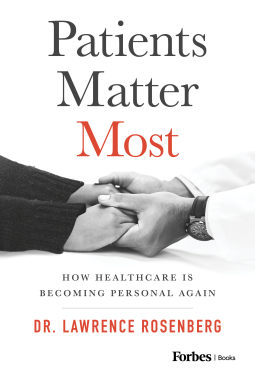
Patients Matter Most
How Healthcare Is Becoming Personal Again
by Lawrence Rosenberg
This title was previously available on NetGalley and is now archived.
Send NetGalley books directly to your Kindle or Kindle app
1
To read on a Kindle or Kindle app, please add kindle@netgalley.com as an approved email address to receive files in your Amazon account. Click here for step-by-step instructions.
2
Also find your Kindle email address within your Amazon account, and enter it here.
Pub Date Aug 08 2023 | Archive Date Aug 08 2023
Advantage Media Group | Forbes Books
Talking about this book? Use #PatientsMatterMost #NetGalley. More hashtag tips!
Description
Understanding the inevitable changes that technology has brought — and will continue to bring — to the healthcare industry will help all of us take more control over our well-being, prevent chronic diseases, and pursue care at the right time, at the right place, in the right way, from the right people. Diagnoses and treatments that once required highly specialized knowledge and equipment are becoming more widely available. Procedures and devices that existed only in large medical centers have shifted into community clinics, stores, and people’s living rooms. Today’s healthcare consumers have more autonomy than yesterday’s passive patients did.
Dr. Lawrence Rosenberg brings a lifetime of experience as a surgeon, medical school professor, and health system CEO to this exploration of every aspect of the changing landscape. Writing in plain language for consumers as well as medical providers, he connects the dots between parallel developments in technology and in healthcare delivery. The result is a wake-up call for healthcare providers to rethink what they do and how and where they do it. Healthcare is only beginning to catch up with other industries in using technologies such as virtual meetings and artificial intelligence, but already these tools are transforming people’s roles. Policymakers and those who train and employ healthcare providers must adapt. But everyone can benefit by better understanding what is happening, when to embrace new ways, and when to be skeptical or cautious.
Big retail and tech corporations see trillion-dollar possibilities in providing healthcare. These new players come with promises of convenience, efficiency, and cost savings, but without some of our healthcare system’s traditional restraints. The regulations and limits imposed on healthcare by governments and private intermediaries, such as insurance companies, are reaching the end of their sustainability. The COVID - 19 pandemic ex posed inequities and vulnerabilities in our access to healthcare but also sparked innovation. Patients Matter Most describes how some innovations are overcoming resistance to change and improving lives, and how others are introducing risks to our privacy. Real-life stories from a physician and healthcare leader who has been on the front lines of managing change make this book a compelling read.
Featured Reviews
 Patricia M, Reviewer
Patricia M, Reviewer
This book really makes me feel optimistic when it comes to Health Care and the technological advances evolving within healthcare. Dr. Rosenberg has served on the frontlines of medicine as a surgeon first then through the ranks of administrations. Based in Canada for most of his career, he is vested in helping patients... all patients. To do this, he describes methods that are reliable, affordable, and easy to use. As patients, we can evolve with these new measures and feel assured that we are being taken good care of as we partner with our medical professionals. I applaud the people way smarter than me for addressing the issues and thinking outside the box to develop new tests and means of treatments. I thank Dr. Rosenberg for shedding light on the grand scheme of things in a comprehensive way. Changes in healthcare need not be a bitter pill, nor do we need to find ourselves bankrupted by practices driven for profit. We are 'patients' not 'customers'. I urge other readers to arm yourself with the insights in this book and find comfort that positive changes are happening.



